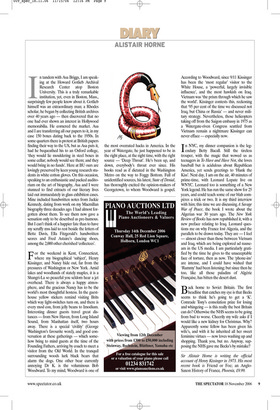I n tandem with Asa Briggs, I am speaking at the
Howard Gotlieb Archival Research Center atop Boston University. This is a truly remarkable institution, yet, even in Boston, Mass., surprisingly few people know about it. Gotlieb himself was an extraordinary man; a Rhodes scholar, he began by collecting British archives over 40 years ago — then discovered that no one had ever shown an interest in Hollywood memorabilia. He cornered the market. Asa and I are transferring all our papers to it, in my case 150 boxes dating back to the 1950s. In some quarters there is protest at British papers finding their way to the US, but as Asa puts it, had he bequeathed his to an Oxford college, ‘they would lie mouldering in steel boxes in some cellar; nobody would see them; and they would bring in no funds’. Here at BU ours are lovingly preserved by keen young research students in white cotton gloves. On this occasion, speaking to an enthusiastic and packed auditorium on the art of biography, Asa and I were stunned to find extracts of our literary lives laid out immaculately in glass exhibition cases. Mine included handwritten notes from Jackie Kennedy, dating from work on my Macmillan biography three decades ago. I had almost forgotten about them. To see them now gave a sensation only to be described as pre-humous. But I can’t think of a happier fate than to have my scruffy mss laid to rest beside the letters of Bette Davis, Ella Fitzgerald’s handwritten scores and Fred Astaire’s dancing shoes, among the 2,000 other cherished ‘collectees’.
For the weekend in Kent, Connecticut, where my biographical ‘subject’, Henry Kissinger, and Nancy hide out, far from the pressures of Washington or New York. Amid lakes and woodlands of stately maples, it is a Shangri-La so peaceful you seldom hear a jet overhead. There is always a happy atmosphere, and the gracious Nancy has to be the world’s most thoughtful hostess. In the guesthouse yellow stickers remind visiting Brits which way light-switches turn on, and there is every mod con, from jelly beans to Imodium. Interesting dinner guests travel great distances — from New Haven, from Long Island Sound, from Manhattan itself, two hours away. There is a special ‘civility’ (George Washington’s favourite word), and good conversation at these gatherings — which somehow bring to mind guests at the time of the Founding Fathers, arriving by coach to meet a visitor from the Old World. In the tranquil surrounding woods lurk black bears that alarm the dogs. One other bear currently annoying Dr K. is the voluminous Bob Woodward. To my mind, Woodward is one of the most overrated hacks in America. In the year of Watergate, he just happened to be in the right place, at the right time, with the right source — ‘Deep Throat’. He’s been up, and down, everybody’s throat ever since. His books read as if dictated in the Washington Metro on the way to Foggy Bottom. Full of unidentified sources, his latest, State of Denial, has thoroughly excited the opinion-makers of Georgetown, to whom Woodward is gospel. According to Woodward, since 9/11 Kissinger has been the ‘most regular’ visitor to the White House, a ‘powerful, largely invisible influence’, and the most hawkish on Iraq. Vietnam was ‘the prism through which he saw the world’. Kissinger contests this, reckoning that ‘95 per cent of the time we discussed not Iraq, but China or Russia’ — and never military strategy. Nevertheless, those helicopters taking off from the Saigon embassy in 1975 as a Watergate-riven Congress scuttled from Vietnam remain a nightmare Kissinger can never efface — especially now.
In NYC, my dinner companion is the legendary Betty Bacall. Still the tireless trouper, with the magic that wowed us as teenagers in To Have and Have Not, she loves baseball but is acidulous about Republican America, yet sends greetings to ‘Hank the Kiss’. Next day, I am on the air, 40 minutes of prime-time, with Leonard Lopate live on WNYC. Leonard too is something of a New York legend. He has run the same show for 25 years, and could teach some of our blah compères a trick or two. It is my third interview with him; this time we are discussing A Savage War of Peace, the book I wrote about the Algerian war 30 years ago. The New York Review of Books has now republished it, with a new preface relating to Iraq. Leonard questions me on why France lost Algeria, and the parallels to be drawn today. They are — I feel — almost closer than those between Vietnam and Iraq, which are being explored ad nauseam in the US media. I am particularly gratified by the time he gives to the unacceptable face of torture, then as now. The ‘phone-ins’ are intense, and I could have wished that ‘Rummy’ had been listening; but since then he too, like all those paladins of Algérie Française, has bitten the desert dust.
Back home to Soviet Britain. The first headline that catches my eye is that Becks seems to think he’s going to get a ‘K’. Comrade Tony’s consolation prize for losing and whingeing — is this really the best Britain can do? Otherwise the NHS seems to be going from bad to worse. Cheerily my wife asks if I would like a new kidney for Christmas. Why? Apparently some fellow has been given his wife’s, and with it he inherited all her sweet feminine virtues — now loves washing up and shopping. Thank you, but no. Anyway, supposing the NHS gave me Becks’s by mistake?


































































































 Previous page
Previous page